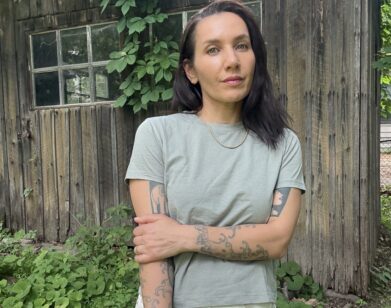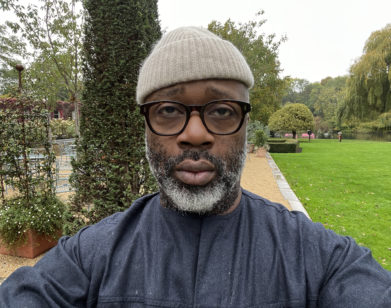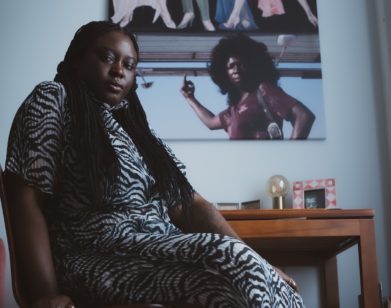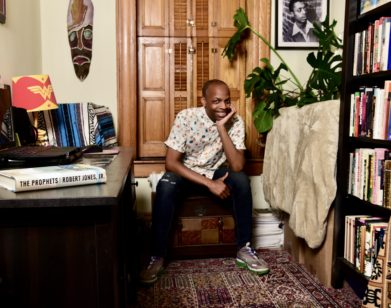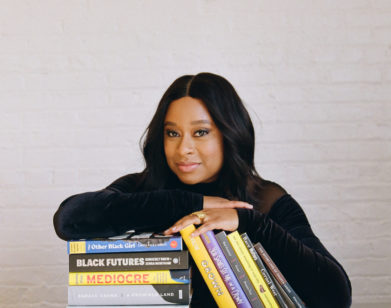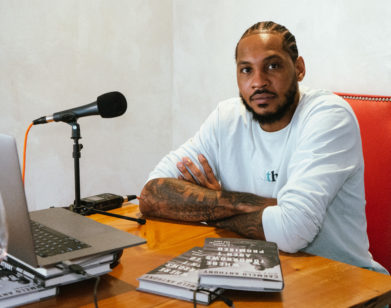Rough Draft
Hanif Abdurraqib’s Favorite Poets are Muhammad Ali and Allen Iverson
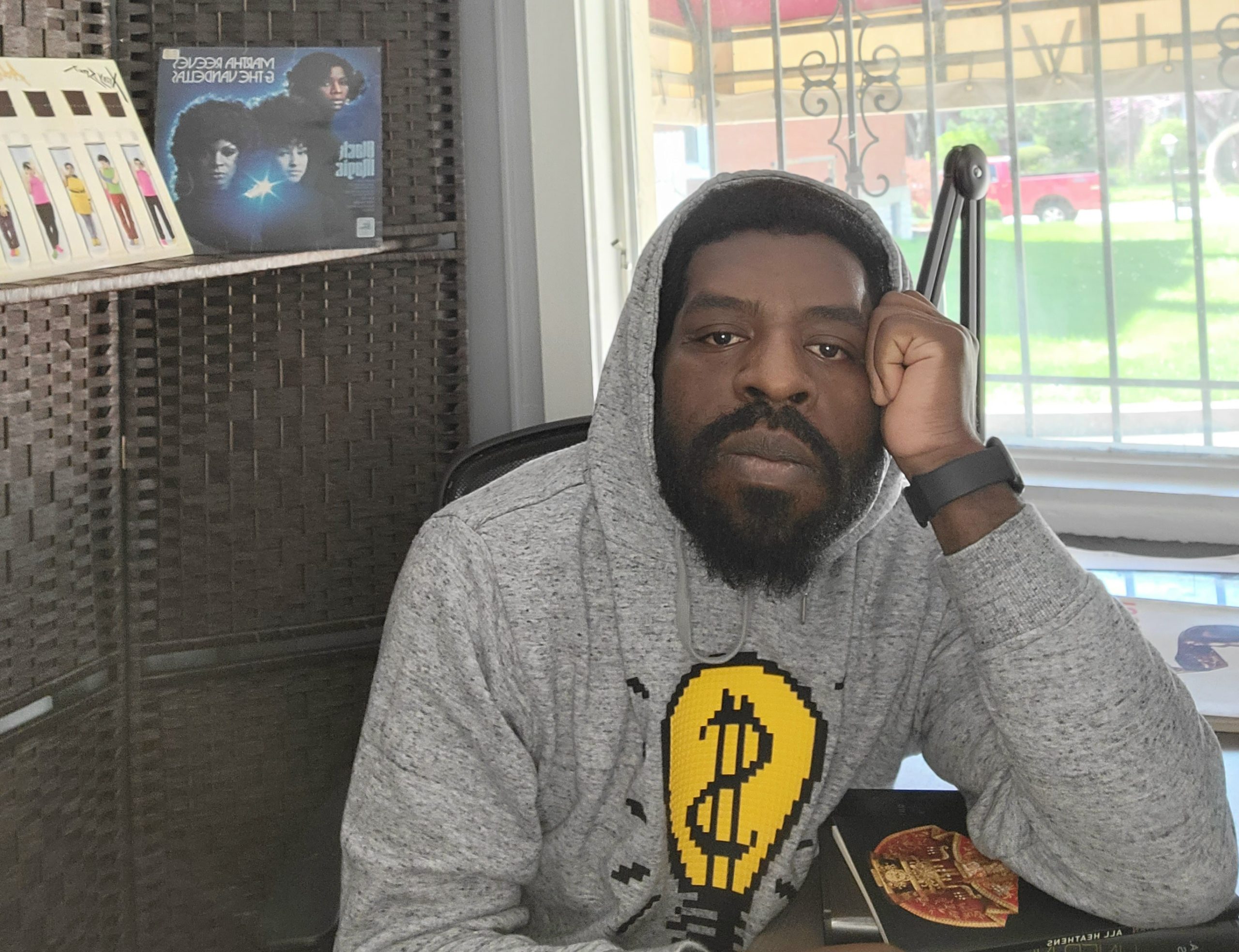
Hanif Abdurraqib at his desk.
This is Rough Draft, in which our favorite writers get to the bottom of their own craft. From preferred writing drinks to whether or not you really need to carry a notebook, we find out all the ways they beat writer’s block and do the work. Before curling up with A Little Devil in America: Notes in Praise of Black Performance, a dynamic new collection of essays from Hanif Abdurraqib, discover all the elements that helped him get it done.
———
JULIANA UKIOMOGBE: Describe your ideal writing atmosphere. What gets you in the mood?
HANIF ABDURRAQIB: It varies, but in the past year I’ve simply become most comfortable at my desk, with the window open, so I can get a pretty good view of the trees my neighbors have, which are really trying their best right now. They’ve got some pink flowers growing on them and weighing down the thin branches, so it looks like somewhat of a glorious waterfall. The downside to this, though, is that I am also acutely aware of my grass, which is in desperate need of being cut. I think, if anything, I find myself in the mood to write to avoid some of the other things I don’t want to do, like cutting grass.
UKIOMOGBE: What drinks or snacks do you like to have while you write?
ABDURRAQIB: I’m not too big on snacking while writing, because I’m bad at distracted snacking, which is something I’ve tried to work on. I’m really big on fruit these days, though. I’m usually at my desk with a plum or a handful of berries. And I’ve always got my water bottle around. I’m really routine-based, and so I work out and/or run most mornings, which means I spend most of the day simply re-hydrating myself.
UKIOMOGBE: Do you keep a notebook or journal?
ABDURRAQIB: I don’t, though I’d like to start keeping a journal. I had one on my desk for a while, though I realized I wasn’t using it. A part of this is that I very simply struggle to read my own handwriting, and so anything I’d scribble down would be lost in the journey of translation between what I wrote and what I can read.
UKIOMOGBE: What’s your favorite quote?
ABDURRAQIB: Today it is “Never mistake what it is for what it look like,” which is a line from the Terrance Hayes poem “What it Look Like.”
UKIOMOGBE: Whose writing do you always return to?
ABDURRAQIB: Octavia Butler, Tracy Chapman, Zora Neale Hurston, Ross Gay, Toni Morrison, ’75-’84 Bruce Springsteen. Muhammad Ali was a poet, Allen Iverson for sure a poet, Kevin Latimer, Fred Moten, Gwendolyn Brooks, MC Lyte, Melissa Febos. Too many, really. I am always returning to someone somewhere.
UKIOMOGBE: What books did you read as a kid/teen? Have your thoughts about the writers changed?
ABDURRAQIB: Just this week I got a first edition set of Lloyd Alexander’s books from the Prydain Chronicles. Those were the books of my childhood, my teenage years, my adulthood. I love them. I think they’ve aged especially well because they were a bit ahead of their time in challenging ideas around masculinity, gender, and entitlement. They’re really incredible books that I hope get to live on the screen sometime soon.
UKIOMOGBE: Do you read while you’re in the process of writing? Which writers inform your current work the most?
ABDURRAQIB: I generally have some tabs open with poems that I’ve loved or I keep a book of poems I am loving near me on my desk. Close to me now is Marianne Chan’s book All Heathens, which I take little nibbles of whenever I find myself stuck in my writing.
UKIOMOGBE: How many drafts of one piece do you typically write?
ABDURRAQIB: I’m usually what I say is a 2.5 draft writer—this because I spend so much time mapping out the first draft internally before I even sit down to the page, and so half of the first draft feels complete when I go to work on it. But then, of course, the reality sets in that the first draft I’ve imagined and the first draft I’m actually capable of achieving are two different things. That feels pretty natural for me, and I enjoy the work of closing the gap between what I believe myself to be capable of and what I’m actually capable of.
UKIOMOGBE: Do you consider writing to be a spiritual practice?
ABDURRAQIB: Not entirely, no. But I think maybe having any kind of spiritual practice (defined as richly or loosely as one would like) can inform and enhance the writing practice.
UKIOMOGBE: Which writers would you choose to have dinner with, living or dead?
ABDURRAQIB: Oh, I don’t know. I’m bad at this. I’m bad at dinner, generally. I mostly just like eating alone in the quiet of my home, standing over the sink, or picking at food while watching basketball. I’d be up for anyone who would want to join me in that, as long as we don’t have to talk too much.
UKIOMOGBE: What advice do you have for people who want to be better writers?
ABDURRAQIB: Put words down with no regard for perfection, which you’ll be hard-pressed to reach anyway.
UKIOMOGBE: Can great writing save the world?
ABDURRAQIB: I think it’s gonna take a lot more than that.

